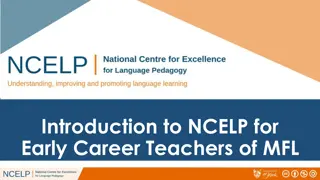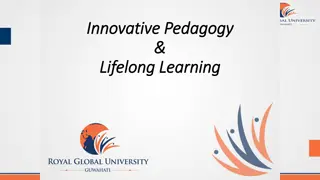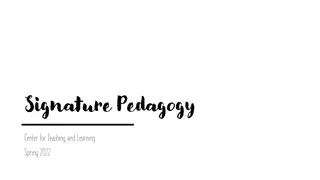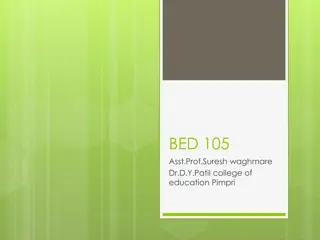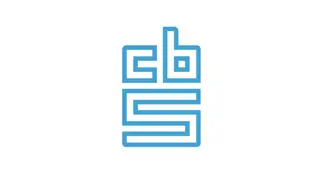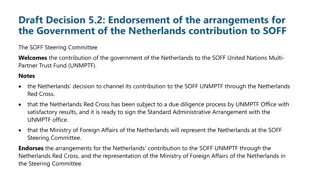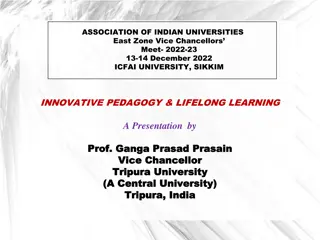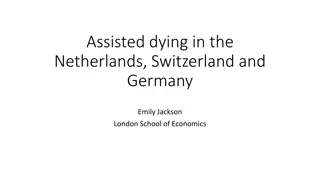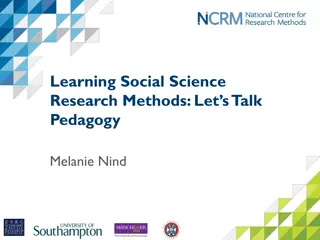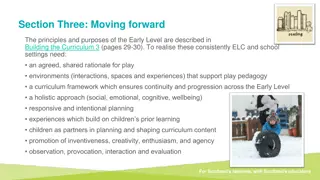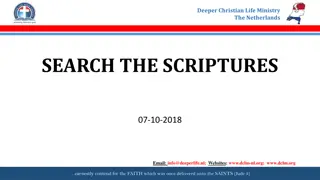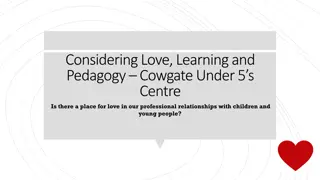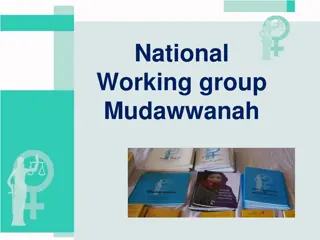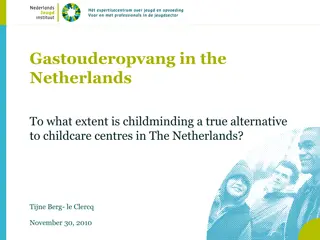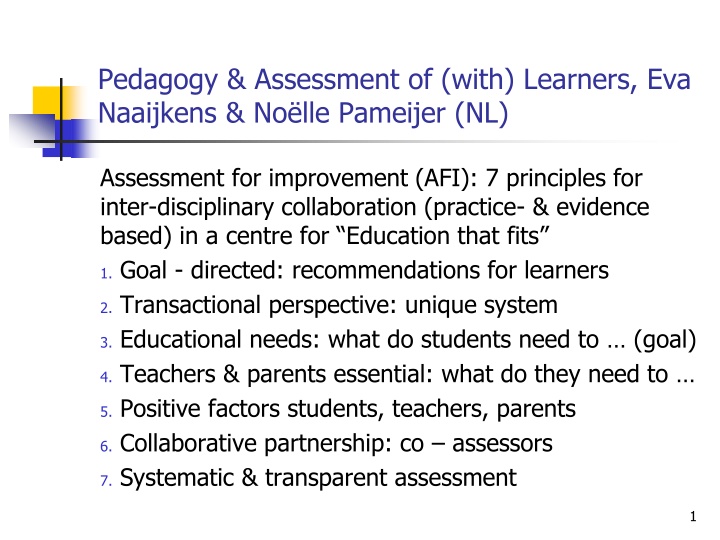
Principles of Interdisciplinary Collaboration in Education Assessment
Explore the 7 principles for interdisciplinary collaboration in educational assessment, focusing on goal-directed recommendations, transactional perspectives, educational needs, essential roles of teachers and parents, positive factors, collaborative partnerships, and systematic transparency in assessment. Understand the significance of goal-directed assessment, students' needs, the impact of teachers, and the importance of parental involvement in supporting learning.
Download Presentation

Please find below an Image/Link to download the presentation.
The content on the website is provided AS IS for your information and personal use only. It may not be sold, licensed, or shared on other websites without obtaining consent from the author. If you encounter any issues during the download, it is possible that the publisher has removed the file from their server.
You are allowed to download the files provided on this website for personal or commercial use, subject to the condition that they are used lawfully. All files are the property of their respective owners.
The content on the website is provided AS IS for your information and personal use only. It may not be sold, licensed, or shared on other websites without obtaining consent from the author.
E N D
Presentation Transcript
Pedagogy & Assessment of (with) Learners, Eva Naaijkens & No lle Pameijer (NL) Assessment for improvement (AFI): 7 principles for inter-disciplinary collaboration (practice- & evidence based) in a centre for Education that fits 1. Goal - directed: recommendations for learners 2. Transactional perspective: unique system 3. Educational needs: what do students need to (goal) 4. Teachers & parents essential: what do they need to 5. Positive factors students, teachers, parents 6. Collaborative partnership: co assessors 7. Systematic & transparent assessment 1
Goal directed assessment Goal assessment = answer questions Understand & Improve situation, in best interest students (Hargreaves & Fullan, 2013) Nice to know Need to know Contributes to: Feed up, feed back & feed forward (Hattie, 2013) Own goals student, teacher, parents more responsibility for own learning 2
Students needs What do students need to achieve goals? Pedagogical needs: type of instruction, feedback, assignments, learning environment, teacher, group, classmates, parents or .. Problem thinking solution focused acting Essential for one, beneficial for all 3
Teachers make a difference Positive teacher - student - relationship = key to success (Koomen & Verschueren, 2016) Teacher training: impact teacher on student? Needs student needs teacher: what does teacher need to support this student more? Knowledge, skills, material or Colleagues, coach or .
Pedagogy: Parents also matter! When parents are involved (Marzano, 2007, Hattie, 2013, Mitchell, 2015) Students wellbeing & learning increase and behaviour problems decrease Parents more satisfied with school Teachers less stress, happier in teaching What support do parents need to support the learning of their child? Knowledge, skills, material, spouse, family, SP or 5
Parental support of learning Supervision: sleep, food, television, gaming, alcohol, drugs, in time at school Involvement: interest, homework, translating schoolwork, support rules teacher, share knowledge on what works, compliment teacher on positive impact High - but realistic expectations What do parents needs to .? 1. 2. 3. 4. 6
Positive factors: dismantle barriers Chances & strengths; talents & interests; exceptions & successful approaches Compliments empowerment + raising expectations of self Optimistic ambitious goals Expand what is already strong feasible recommendations 7
Challenges & successes AFI? Challenges, more attention for positive factors parents; collaboration with all children; feasible interventions for teachers that they can apply in classroom & that benefit more students Successes: teacher s competency raises (6.2 7.4), 80% teachers benefits > costs AFI, 80% parents appreciate participating, same language & goals interdisciplinary: benefit child 8
Research on AFI? See appendix in RA Netherlands country report 198 assessments Teachers, counsellors, parents, students & assessors Questionnaire: Assessment according to principles? Teachers, students, parents more insight & feasible recommendations? Challenges & successes? 9
Principal AFI (%) Principal AFI, according to % 1. Goal directed - Goals formulated - Goals evaluated Teachers Counsellors Parents Assessors 98 93 87 87 93 100 96 83 2. Transactional 3. Child s needs - Educational needs - Parenting needs 98 98 84 87 99 85 4. Needs - Teachers - Parents 93 92 95 86 85 5. Positive Factors - Student - Teacher 100 73 100 83 87 48 96 72 - Parents 73 83 50 55 10
Goal assessment (%) Goal assessment, according to % Teachers Counsellors Parents Assessors 1. Better understanding of situation (more insight) 90 85 65 95 2. Feasible recommendations for teachers 70 60 80 3. Feasible recommendations for parents 52 43 11

